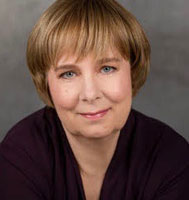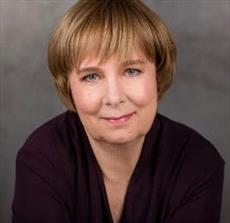
Dr. Michele Gaspar

Photo by Brian McConkey
Dr. Michele Gaspar is a veterinarian and psychotherapist.
AUTHOR'S NOTE
It pains me to think that my words in the original version of this commentary were perceived by some as indicating that there was some magic wand when used would make mental health issues go "poof!" The intention was much, much different. There are no easy answers to these issues and I know well that it is, indeed cruel and counter-productive to this and similar conversations, to offer pat answers that belie the seriousness of the struggle that so many undertake every day. The paragraph marked by * below has been updated from the initial published version to emphasize this point.
Recent news of the suicides of two Santa Barbara veterinarians has again raised concerns that our profession has a heightened risk for suicide. Those concerns appear to be valid, although how high our risk is remains debatable.
The evidence is conflicting. In one 2016 U.S. Centers for Disease Control study, health professionals, including veterinarians, were found to have a risk 80 percent lower than that of farmers, fishery workers and lumberjacks, the occupations with the highest suicide rates. A separate analysis of professions with the highest suicide rate ranked veterinarians with police officers as having the third-highest risk. Only dentists and physicians ranked higher.
The supposed causes of our increased risk are varied: high debt relative to income, long hours/poor work-life balance, moral distress, burnout, compassion fatigue, the euthanasias of often beloved patients, social-media bullying, and the unreasonable demands of employers and clients. It also has been argued that for some vulnerable individuals, the veterinary profession simply is a provocative environment.
As a psychotherapist, I have come to appreciate that each suicide is as unique as the individual. This is borne out in the backstories I have been privy to of colleagues who have attempted to take or taken their lives. The triad of hopelessness, isolation and the inability to believe that challenges can be met and, if not overcome, at least survived, are the commonalities. Depression, anxiety and bipolar disorder, usually poorly controlled, frequently are in the mix, as well.
My frustration with the conversations that inevitably result each time a colleague suicides is that the responses are predictable and generally unhelpful. We’re stuck in a loop. Some bemoan our fate as martyrs in a profession the complexities of which are misunderstood by many who seek our services.
A second and truly malevolent (to me) approach that periodically gains momentum on social media is to place the blame squarely on the shoulders of clients and strangers we meet at cocktail parties and argue that people just aren’t “nice” enough to us.
Others believe that we need to turn our attention to increased wellness programs, which can be helpful but still fall short of the mark. Meditation, yoga, increased social support networks, good nutrition and exercise are all good, but when one is bleeding, it’s not enough to place a bandage over the wound; one often needs to go in, find the bleeder and address it.
*With many in the profession, metaphorically speaking, bleeding, I believe it’s time to do that deep digging on individual and systemic levels, with the goal of becoming whole. The journey to wholeness, however, is not a straight trajectory. For many of our colleagues, who struggle with depression, anxiety and other mood disorders, the path is arduous and long. It would be wrong to say there is an easy answer or answers to their struggles. However, in my conversations with many veterinarians who struggle with the day-to-day challenges of practice, these areas might be fruitful for consideration.*
Address our perfectionism
If you’re reading this, I guarantee that you’re a perfectionist. Admittedly, I used to believe that perfectionism had some benefits (primarily academic and professional success), but after reading the work of Paul Hewitt, a University of British Columbia professor of psychology and registered clinical psychologist who has spent his professional life studying perfectionism and its attendant pathologies of anger, depression, anxiety, shame and suicidal tendencies, I believe perfectionism is maladaptive.
The roots of perfectionism usually are found in children as young as 5 years of age. Being told or feeling that one is defective, or being complimented for being “good,” are usually what drives perfectionistic tendencies.
However, none of us is perfect, and we need to go into each day acknowledging that. We all need to give ourselves a big dose of self-compassion and extend it to our colleagues, support staffs and, yes, clients.
We sometimes mistakenly think that self-compassion means that we collude with ourselves and dole out “mulligans” for mistakes. However, work done by Kristin Neff, an associate professor in educational psychology at the University of Texas at Austin, and others, has shown that self-compassion actually reduces clinical errors. The anxiety, internal and external critics and hyper-vigilance of the perfectionist, on the other hand, actually increase their likelihood.
Get OK with death, because that's what we do
How we deal with death (our own and others') is referred to as “existential maturity.” I believe this critical life skill is largely unaddressed in veterinary medicine. The irony is that there is probably no other health profession, including human oncology practice, that deals with death as frequently as ours.
If your veterinary school training was like mine, it often was marked by over-heroic attempts to stave off death. Please don’t get me wrong: We are, of course, trained first and foremost to heal and support life. But at a time when human medicine is asking good, difficult questions about the value of extending life under certain circumstances, veterinarians seem to be running in the opposite direction, pulling out all the stops when the truly humane thing is to stop.
Rabbi Michael Oblath, the partner of our colleague Dr. Lorelei Hass, and I are noodling around a Veterinary Information Network CE course on existential maturity for veterinarians in early 2019. In the meantime, if you’d like to avail yourself of some thought-provoking reading and listening on the topic, I highly recommend “When Breath Becomes Air” by the late Paul Kalanithi, a neurosurgeon who wrote about his life and battle with metastatic lung cancer; and following Kate Bowler, a historian at Duke Divinity School. We need to believe that, as the late American philosopher Tom Regan wrote, death is the ultimate loss but not the worst harm.
Address our need to appease and accommodate
By and large, veterinarians are people pleasers. We want our patients to like us and stay/get well; we want our clients to appreciate us; and we want our employers to understand the sacrifices we make each day. Many of us subordinate ourselves in the attempt to make all of that happen.
As you might imagine, the tendencies to appease and accommodate do not spring de novo in adults; they are typically adaptive ways used to deal with our environments as children and adolescents. Oftentimes, there was a depressed parent who needed to be consoled or taken care of. Other times, there were caregivers who were alcoholic, absent or simply unresponsive in ways that we needed them to be.
Kids have limited repertoires for dealing with anxiety-provoking situations. Appeasement and accommodation are in their wheelhouses. However, that which worked for us as children rarely works for us as adults. The practice of putting others first and ensuring that others are happy often translates into working above and beyond what is reasonable, tolerating untenable situations, the inability to say “no,” and losing ourselves in the process, all the while raging inside with anger.
That anger comes out in many different ways: depression (anger turned inward), a hair-trigger temper, substance abuse, random sexual encounters, or a slow burn with rage.
If this sounds familiar, then finding a good therapist who will do more than nod his or her head and is willing to get into that place of dark memories, disappointments and anger with you is a necessary next step.
Achieve developmental maturity
Several years ago, I was at a conference where lunchtime found me sitting next to a social worker from a veterinary school counseling department. She had spent her career in student services and was familiar with most student populations. Looking up from her plate, she leaned in and whispered: “Do you think that veterinary students, by and large, are developmentally younger than their peers?” I told her I thought so.
Why that should be, I don't know. Perhaps it has something to do with feeling an affinity for and connection with animals more than people. Whatever the reason, clinical medical practice demands that each day, we be the adult in the room. That doesn’t mean we can’t shed tears with clients, and it doesn’t mean we lose our compassion.
What it does mean is that we do not personalize what a client, colleague or staff member says. It means we learn to avoid being pulled into a client’s projections and anger. It means we realize that we can control only what we say and how we say it. What others do, say or perceive is out of our reach. Empathy means understanding the client's or patient's perspective while at the same time keeping one foot firmly entrenched in our own reality. And ultimately, we can do only what time and resources allow.
Even taking all the steps outlined above, the fact is that we will never achieve a zero suicide rate in our profession. We are human, and within every profession and segment of society, there are some who will make this choice whom we cannot help because they will not let us do so.
Michele Gaspar, DVM, DABVP (Feline Practice), MA, LCPC, is a VIN consultant in feline internal medicine and member of Vets4Vets, a free service of the VIN Foundation that helps colleagues navigate personal and professional challenges. Michele is a psychotherapist with Live Oak Chicago, where she provides individual therapy to adults. She is a second-year analytic candidate at the Chicago Institute for Psychoanalysis.